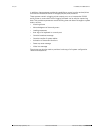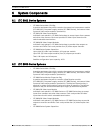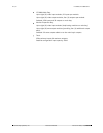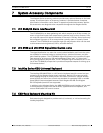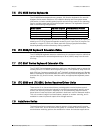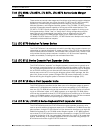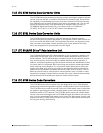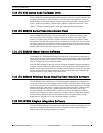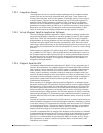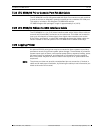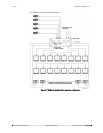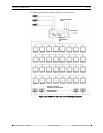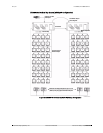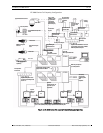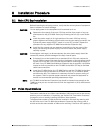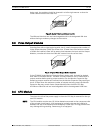
22 | en LTC 8600 | LTC 8800 Series
Bosch Security Systems, Inc. Instruction Manual F.01U.127.393 | 2.0 | 2009.03
7.23.1 Integration Server
The Integration Server is a versatile software package used to integrate multiple
systems that are not ordinarily compatible with each other. These systems can
include video switchers, point of sale systems, fire/burglar alarms, access control,
or HVAC systems. Devices can be interfaced using any of the following three (3)
methods: serial RS-232 connection, digital I/O card, or directly to an Allegiant
Switcher via the LTC 8059 MCS program. The Integration Server software is pro-
grammed to recognize events as they occur in real time from one or more systems,
based upon one of the three (3) integration methods mentioned above. It then
reacts to those events by sending commands to another system or systems.
7.23.2 Virtual Allegiant Satellite Application Software
The Virtual Allegiant Satellite Application (VASA) is Bosch's strategic product that
allows existing Allegiant customers to transition gradually to pure IP technologies
rather than a total and instantaneous replacement. VASA acts as the integration
bridge between an existing Allegiant and the new digital based CCTV system (the
'satellite') that uses digital video encoders and decoders. With VASA, the new IP
technology is totally transparent to the existing Allegiant users who continue to use
their Intuikey CCTV keyboards for video switching and PTZ control on classic analog
monitors.
VASA supports the Allegiant LTC 8100 through the LTC 8900 Series matrix switch-
ers. In addition to PTZ control, VASA provides auxiliary and preposition control of
the IP-based cameras. VASA improves the ROI on existing capital assets, removes
the need for training, and reduces the risk for adopting new technology by incre-
mentally adding to the system. The integration is seamless and the transition is
designed to be imperceptible.
7.23.3 Allegiant Satellite SDK
The Allegiant Satellite Software Development Kit (SDK) is a fully supported set of
libraries, documentation, and samples targeted at PC-based application software
that is used to control 3rd party CCTV matrix systems or manage IP-based digital
video networks. Since the SDK can be used to create customized solutions for
unique, specific problems, customers looking to integrate an Allegiant matrix sys-
tem with products offered by other manufacturers is readily accomplished. For the
thousands of existing Allegiant customers, it also provides a bridge to integrate or
expand their systems with IP based products gradually rather than a total and
instantaneous replacement.
When operating in an Allegiant satellite system configuration, an Allegiant master
generates switching and PTZ data that is typically used to control a remote Allegiant
satellite matrix. Using the SDK, the video switching commands and PTZ data from
the master system are converted into an ActiveX interface allowing developers to
easily translate this information into formats used to control other original equip-
ment manufacturer's (OEM) systems. The SDK also supports an ability to translate
repetitive type Allegiant PTZ commands to their indefinite equivalents, resulting in
reduced interface traffic and lower bandwidth demands when controlling IP based
networks.
The level of integration available with the SDK results in a robust interface that pro-
vides transparent operation to the existing Allegiant operators. Operators continue
to use their existing CCTV keyboards for selecting video and control of PTZ devices
on the Allegiant monitors. This type of solution improves the return of investment
on existing capital assets, removes the need for training, and reduces the risk for
adopting new technology by incrementally adding to the system.
The SDK is compatible with all models of the Allegiant Series switchers. In addition
to video switching commands and PTZ control, auxiliaries and prepositions are also
supported. The SDK is supplied with five sample applications. Three (3) applica-
tions use C++ to demonstrate incorporating the SDK in a console, an ATL, and an
MFC application. In addition, samples using Visual Basic
®
, and Microsoft's .NET
Framework are included.



